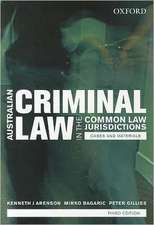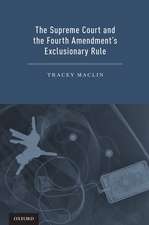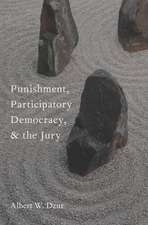The Preventive Turn in Criminal Law: Oxford Monographs on Criminal Law and Justice
Autor Henrique Carvalhoen Limba Engleză Hardback – 27 apr 2017
Din seria Oxford Monographs on Criminal Law and Justice
- 21%
 Preț: 592.01 lei
Preț: 592.01 lei - 21%
 Preț: 594.09 lei
Preț: 594.09 lei - 21%
 Preț: 593.31 lei
Preț: 593.31 lei - 30%
 Preț: 539.18 lei
Preț: 539.18 lei - 15%
 Preț: 719.91 lei
Preț: 719.91 lei - 14%
 Preț: 272.92 lei
Preț: 272.92 lei - 26%
 Preț: 549.01 lei
Preț: 549.01 lei - 34%
 Preț: 775.71 lei
Preț: 775.71 lei - 23%
 Preț: 366.85 lei
Preț: 366.85 lei - 30%
 Preț: 774.62 lei
Preț: 774.62 lei - 23%
 Preț: 886.40 lei
Preț: 886.40 lei - 19%
 Preț: 364.48 lei
Preț: 364.48 lei - 34%
 Preț: 993.94 lei
Preț: 993.94 lei - 18%
 Preț: 947.45 lei
Preț: 947.45 lei - 34%
 Preț: 645.29 lei
Preț: 645.29 lei - 18%
 Preț: 913.02 lei
Preț: 913.02 lei - 34%
 Preț: 656.78 lei
Preț: 656.78 lei - 28%
 Preț: 367.50 lei
Preț: 367.50 lei - 30%
 Preț: 833.73 lei
Preț: 833.73 lei - 34%
 Preț: 837.28 lei
Preț: 837.28 lei - 34%
 Preț: 773.67 lei
Preț: 773.67 lei - 30%
 Preț: 673.34 lei
Preț: 673.34 lei -
 Preț: 290.26 lei
Preț: 290.26 lei - 26%
 Preț: 774.24 lei
Preț: 774.24 lei - 28%
 Preț: 416.36 lei
Preț: 416.36 lei - 34%
 Preț: 950.84 lei
Preț: 950.84 lei - 34%
 Preț: 994.39 lei
Preț: 994.39 lei - 29%
 Preț: 689.43 lei
Preț: 689.43 lei - 30%
 Preț: 576.57 lei
Preț: 576.57 lei - 34%
 Preț: 745.83 lei
Preț: 745.83 lei - 34%
 Preț: 862.69 lei
Preț: 862.69 lei - 30%
 Preț: 833.06 lei
Preț: 833.06 lei - 34%
 Preț: 851.82 lei
Preț: 851.82 lei - 34%
 Preț: 1009.46 lei
Preț: 1009.46 lei - 30%
 Preț: 834.28 lei
Preț: 834.28 lei - 18%
 Preț: 677.01 lei
Preț: 677.01 lei -
 Preț: 338.49 lei
Preț: 338.49 lei - 34%
 Preț: 918.79 lei
Preț: 918.79 lei - 30%
 Preț: 575.66 lei
Preț: 575.66 lei - 28%
 Preț: 353.88 lei
Preț: 353.88 lei - 34%
 Preț: 864.49 lei
Preț: 864.49 lei - 30%
 Preț: 499.66 lei
Preț: 499.66 lei - 34%
 Preț: 963.69 lei
Preț: 963.69 lei
Preț: 545.36 lei
Preț vechi: 782.01 lei
-30% Nou
Puncte Express: 818
Preț estimativ în valută:
104.39€ • 113.43$ • 87.74£
104.39€ • 113.43$ • 87.74£
Carte tipărită la comandă
Livrare economică 09-15 aprilie
Preluare comenzi: 021 569.72.76
Specificații
ISBN-13: 9780198737858
ISBN-10: 0198737858
Pagini: 224
Dimensiuni: 171 x 242 x 21 mm
Greutate: 0.5 kg
Editura: OUP OXFORD
Colecția OUP Oxford
Seria Oxford Monographs on Criminal Law and Justice
Locul publicării:Oxford, United Kingdom
ISBN-10: 0198737858
Pagini: 224
Dimensiuni: 171 x 242 x 21 mm
Greutate: 0.5 kg
Editura: OUP OXFORD
Colecția OUP Oxford
Seria Oxford Monographs on Criminal Law and Justice
Locul publicării:Oxford, United Kingdom
Recenzii
The Preventive Turn in Criminal Law does a superb job of connecting political theory, criminal law theory and criminalization. In so doing, Carvalho amply demonstrates his capacity for interdisciplinary enquiry at the highest level and one can only hope that he might consider undertaking a similarly penetrating exploration of the wider import of social theory for criminal law and criminalization. It would make a splendid companion volume to this outstanding first monograph.
Henrique Carvalho's book makes an important contribution to the growing literature on the deployment of the substantive criminal law in an anticipatory mode.
Carvalho's critique of liberal criminal justice is important for two reasons. The first is that it renews the critique of criminal justice thinking as unconscious repetition. The second is that it makes a critical theory of recognition available to criminal justice scholarship, and opens a door to recent developments in psychoanalytic theory.
This is an important and challenging interpretation of the so-called 'preventive turn' in criminal law. Carvalho argues that, far from being a development that is at odds with the logic and values of criminal law, as much academic commentary suggests, the logic of prevention is actually embedded in core concepts such as individual autonomy and responsibility. These, therefore, cannot be the bulwark against the spread of preventive offences, because, in practice, they have enabled the development of these measures. Against this Carvalho challenges us to rethink concepts such as liberty or autonomy as social concepts and to understand them in ways which do not further embed the preventive logic which lies at the heart of the modern criminal law. Overall this is an important contribution to the critical analysis of criminal law and criminal law theory.
Carvalho's insight that, far from representing a radical and worrying break in the liberal tradition, the criminal law's preventive turn towards inchoate and pre-inchoate offences is in fact paradigmatic of liberalism, makes an important and provocative contribution to current debates on criminal justice.
Henrique Carvalho's book makes an important contribution to the growing literature on the deployment of the substantive criminal law in an anticipatory mode.
Carvalho's critique of liberal criminal justice is important for two reasons. The first is that it renews the critique of criminal justice thinking as unconscious repetition. The second is that it makes a critical theory of recognition available to criminal justice scholarship, and opens a door to recent developments in psychoanalytic theory.
This is an important and challenging interpretation of the so-called 'preventive turn' in criminal law. Carvalho argues that, far from being a development that is at odds with the logic and values of criminal law, as much academic commentary suggests, the logic of prevention is actually embedded in core concepts such as individual autonomy and responsibility. These, therefore, cannot be the bulwark against the spread of preventive offences, because, in practice, they have enabled the development of these measures. Against this Carvalho challenges us to rethink concepts such as liberty or autonomy as social concepts and to understand them in ways which do not further embed the preventive logic which lies at the heart of the modern criminal law. Overall this is an important contribution to the critical analysis of criminal law and criminal law theory.
Carvalho's insight that, far from representing a radical and worrying break in the liberal tradition, the criminal law's preventive turn towards inchoate and pre-inchoate offences is in fact paradigmatic of liberalism, makes an important and provocative contribution to current debates on criminal justice.
Notă biografică
Henrique Carvalho is an Associate Professor at Warwick Law School, University of Warwick.













